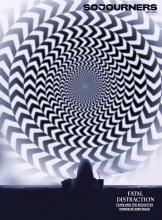FOR SOME REASON, conversations about economics and the church are rare these days — even though scripture includes more than 2,000 verses on poverty, such as laws in the Hebrew Bible on debt, labor, and land ownership. In the gospels, Jesus had many conversations with people about their relationship to money.
Our daily lives wade in the waters of economics, even in the most ordinary ways. When I brushed my teeth this morning, for instance, I used a brand-name electric toothbrush and a brand-name toothpaste, one that claims to be gentle on tooth enamel. After leaving my apartment, I gazed ahead to the street corner, where a man with a familiar face extended his hand in need to passersby. On the streets of New York City, the human cost of economic insecurity is painfully evident. I made my way eastbound toward Park Avenue; the potholes had me pondering how my hood is often overlooked in the city’s infrastructure budget. Yet, somehow, new “affordable” luxury apartments pop up, seemingly out of nowhere; I sometimes wonder if these buildings just appear overnight, ready-made. I’m also reminded that our local community board, through its land use committee, had some say in these new developments.
Read the Full Article

